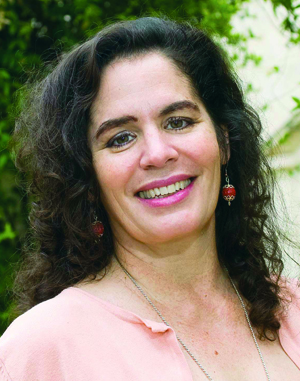Monika Merola overcomes brain injury and reaches academic goals
Monika Merola was struck by an epiphany eight years ago while walking her 6-year-old daughter, Cecilia, home from kindergarten.
“Mommy, why don’t you have a degree?” asked Cecilia.
Merola stopped in her tracks and suddenly felt tears well up in her eyes.
“I thought, how could I encourage her to pursue her education when I haven’t attempted to complete my degree?” said Merola, who had never completed her degree because she was taking care of her children. “That’s when I knew I had to go back to UT.”
Recovering from a near-fatal brain aneurysm, caused by a stroke, that rendered her legally blind in 2000, Merola spent a year doing very little but praying and walking her daughter to and from school every day.
After brain surgery, doctors said that if she went through cognitive therapy, Merola might one day be able to live a comfortable, normal life again. But going back to college was out of the question.
They were right about living a normal life – but wrong about college. At age 49, three decades after first setting foot in a college classroom at The University of Texas at Austin, Merola walked across the stage and received her bachelor’s degree in Spanish and Mexican American studies, exceeding her doctors’ expectations.
Accepting the roadblocks caused by her disability was a frustrating process – especially during her first semester back at college. Developing outlines for research papers and paying attention to detail proved to be major obstacles in many of her classes. Merola, who was a diligent straight-A student throughout high school and college, had a tough time accepting low grades on her papers and tests.
“My brain injury specialist told me getting a degree is the single most difficult undertaking for a brain-injured patient,” Merola said. “I am one of only 10 patients she has encouraged to do so.”
Before undergoing brain surgery in 2000, she knew there was a chance she would lose her ability to move. But the idea of losing her Spanish frightened her the most. Fluent in Spanish since age 17, Merola learned to speak the language while attending elementary school in Hampton, VA. Although she is not a native Spanish speaker, she said she had many of her college and high school Spanish instructors fooled.
“I was horribly frightened that this wonderful language that has enriched my life so much would be taken from me,” Merola said. “And I worked so hard to become fluent.”
When she awoke from surgery, she surprised herself and her family when she began singing in Spanish. After that, she knew she was well on the road to recovery.
“I am somehow certain being bilingual has been instrumental in helping my brain to rewire itself,” she said, smiling. “I have always had a strong will, which was not lost with the brain damage. Essentially, my stubbornness has served me well.”
Prior to the brain aneurism, Merola worked as a senior financial analyst for 17 years. She was highly skilled in accounting and bookkeeping, but after the brain injury, she had trouble balancing her checkbook. In addition to losing more than half her vision, the brain damage depleted her thought-processing and problem-solving abilities.
“Learning about and accepting the complexities of my disability has been a gradual, sometimes painful process,” Merola said. “Keeping a positive attitude is essential. More than anything, my faith has carried me through.”
With her second chance at life, Merola believes in enjoying every precious moment she has with her teenage daughter, and her two sons, who are both college graduates. Although it took decades to accomplish her lifelong goal of earning a degree, Merola is happy she decided to take an extended break from school to raise her family.
She is still weighing her options for life after graduation. With her love of the Spanish language, she strives to work with native Spanish speakers to help them hone their English speaking abilities. She’d also like to be an advocate for students recovering from brain injuries.
The most important advice she has for students with learning disabilities is to ask for help.
Merola credits the university’s faculty and staff, including Arlene Montgomery, a lecturer in the School of Social Work, and Cristina Cabello de Martinez, a lecturer in the Department of Spanish and Portuguese, for their emotional support and assistance guiding her through the university’s resources such as Services for Students with Disabilities.
“Monika is gifted with courage and empathy that exceeds anyone’s expectations, yet she is humble, intelligent and filled with a childlike joy that can only bring happiness and awe to anyone’s heart,” Cabello de Martinez said. “With eloquence she has accomplished her dual degrees, and in the process, enlightened many of us who have had the privilege to work with her.”
